Photo gallery
Image database with photographs of ancient art and antiquities
Our image database provides photographs of ancient art and antiquities for press releases as well as for private use. All artefacts sold in our gallery are documented through professional photographs. The resulting image library contains numerous ancient Egyptian, Greek and Roman antiquities as well as ancient coins. The time span from Stone Age, over Bronze Age and Classical Antiquity until Late Antiquity is covered.The photo gallery aims at providing a vast visual archive equipped with filters and search tools. You are most welcome to search the constantly growing number of artefacts in the image library. We are also happy to authorize hyperlinks from your webpage / forum to the objects depicted in our gallery. For this purpose, please send us a short notification prior to placing a hyperlink. For almost every object high definition photographs are available and can be provided e.g. to document your collection or for scientific papers or popular science articles. If you are interested in using pictures for publications, print media or other purposes, please contact us and we will be happy to assist you.
-
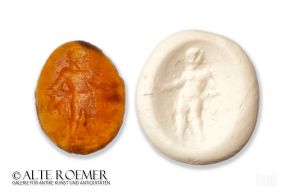 Roman intaglio of a silenus
Roman intaglio of a silenusThe nature spirit is standing naked, depicted with a beard and bald head. Nice orange glass paste.
Price: on request Roman intaglio with warrior leaning on helmet
Roman intaglio with warrior leaning on helmetInteresting scene formed into an opaque blue glass paste. From the Professor Brosch collection of engraved gems.
Price: on request Predynastic beaker with black top
Predynastic beaker with black topA perfect example of the highly distinctive black-topped ware from the Naqada I and II culture. The tall jar is impressively well preserved.
 Egyptian scarab
Egyptian scarabThe scarab is made of nice marbled stone. Schematical upper side, structured, unengraved bottom side. From the Late Period of Ancient Egypt.
 Egyptian faience statuette of Taweret
Egyptian faience statuette of TaweretTypical depiction of the protective goddess for pregnant women. A piece of superior quality and great detail. From the Late Period of Ancient Egypt.
 Egyptian ushabti for Pa-di-pepet
Egyptian ushabti for Pa-di-pepetThe tomb of Pa-di-pepet was discovered in 1893 west of the Pyramid of Teti at Saqqara. His funerary statuettes were given to important museums and into private collections. Dating to the reign of Pharaoh Psamtik I and his successor Necho II.
Price: on request Three neolithic arrowheads from Egypt
Three neolithic arrowheads from EgyptThe Stone Age points are beautifully crafted, with finely serrated edges. From a 100 year old museum collection.
Price: on request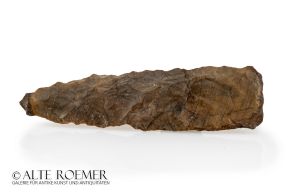 Neolithic stone tool from Egypt
Neolithic stone tool from EgyptThe Stone Age weapon's point or knife blade is well crafted, with finely serrated edge. From a 100 year old museum collection.
Price: on request Corinthian aryballos in the form of a ram
Corinthian aryballos in the form of a ramBeautiful small vessel for perfumed oil from the heyday of Corinthian pottery production, at the beginning of the 6th century BC.
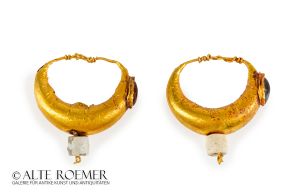 Graeco-Roman earrings with gemstones
Graeco-Roman earrings with gemstonesMatching pair of jewellery made of gold with gemstone of red garnet and white glass bead. From an ancient workshop in Egypt or the Levant.
Price: on request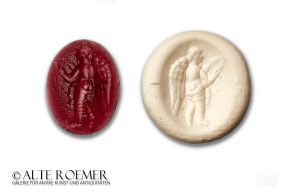 Roman intaglio with winged goddess
Roman intaglio with winged goddessThe glass paste has a remarkably vibrant violet colour. From the Professor Brosch collection of engraved gems.
Price: on request Roman intaglio with satyr
Roman intaglio with satyrBrown glass paste with white decorative band. The piece boosts a high quality depiction of a panther's skin. The upper part missing.
Price: on request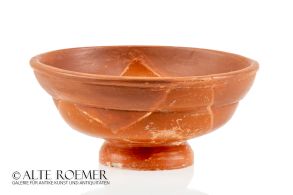 Roman Terra Sigillata bowl with potters' mark from the Rhineland
Roman Terra Sigillata bowl with potters' mark from the RhinelandFound near the Roman city of Novaesium, today's Neuss in Germany, an early Roman foundation and with this one of the oldest cities in Germany.
Price: on request Very fine Trajan sestertius with beautiful patina
Very fine Trajan sestertius with beautiful patinaThe reverse shows Arabia standing to the left, holding branch and sugar cane, camel at her feet. The legend ARAB(ia) ADQ(uista) underlines that Arabia was acquired by Rome.
Price: on request Large Visigoth bow brooch
Large Visigoth bow broochImpressive fibula of the Visigoths from the Migration Period. With five originally preserved glass inserts.
Price: on request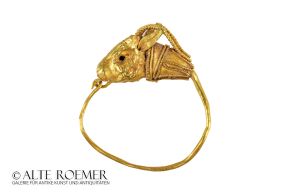 Hellenistic gold earring with antelope head
Hellenistic gold earring with antelope headEar pendant with plastically modeled head of an antelope. The elaborately made head is typical for hellenistic gold jewellery.
Price: on request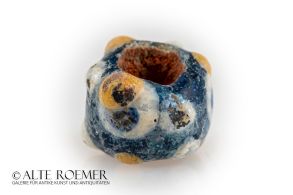 Phoenician eye bead
Phoenician eye beadPolychrome glass bead with stylized elements of a face as protection against the evil eye. Produced in Carthage or the Phoenician homeland, 4th to 3rd century BC.
Price: on request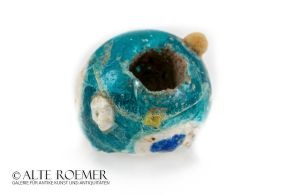 Phoenician eye bead
Phoenician eye beadPolychrome glass bead with stylized elements of a face as protection against the evil eye. Produced in Carthage or the Phoenician homeland, 4th to 3rd century BC.
Price: on request Roman appliqués of Sol Invictus and Luna
Roman appliqués of Sol Invictus and LunaEnsemble of two nice terra cotta examples of the cult around the Roman sun god and moon goddess in Roman Imperial times.
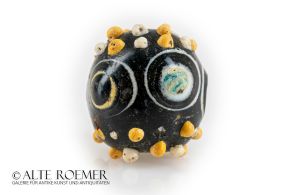 Large Phoenician eye bead
Large Phoenician eye beadDark and unusually large glass bead with stylized elements of a face as protection against the evil eye. Produced in Carthage or the Phoenician homeland, 4th to 3rd century BC.
Price: on request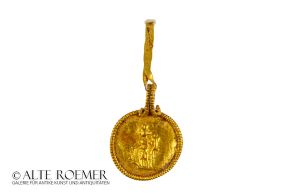 Roman medallion with Fortuna
Roman medallion with FortunaThe piece of gold jewellery could be worn as a pendant on the ear or on a necklace. The relief shows Fortuna, the goddess of fortune and fate, with her typical attributes. Made between the 1st and 3rd century.
Price: on request Three neolithic arrowheads from Egypt
Three neolithic arrowheads from EgyptThe Stone Age points are beautifully crafted, with finely serrated edges. From a 100 year old museum collection.
Price: on request Predynastic hippopotamus amulet
Predynastic hippopotamus amuletWonderful figurine made of orange-red carnelian. Dating to the birth of Ancient Egypt. The rare piece was already scientifically studied in 1913.
Price: on request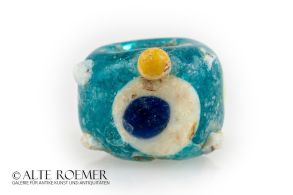 Phoenician eye bead
Phoenician eye beadPolychrome glass bead with stylized elements of a face as protection against the evil eye. Produced in Carthage or the Phoenician homeland, 4th to 3rd century BC.
Price: on request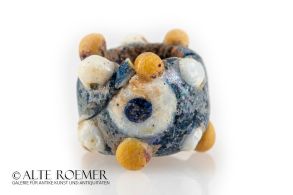 Phoenician eye bead
Phoenician eye beadPolychrome glass bead with stylized elements of a face as protection against the evil eye. Produced in Carthage or the Phoenician homeland, 4th to 3rd century BC.
Price: on request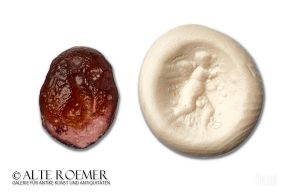 Roman intaglio with child Eros
Roman intaglio with child ErosRoman glass paste with dynamic scene. It shows the god running. Made of purple glass, imitating amethyst.
Price: on request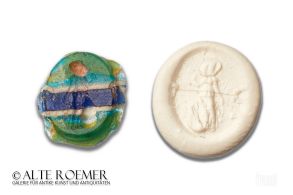 Beautifully banded roman glass paste
Beautifully banded roman glass pasteThe roman intaglio shows a standing naked god. Wonderful green ring insert with blue and white decorative band.
Price: on request Paleolithic hand axe
Paleolithic hand axeSmall prehistoric stone tool. It was the universal tool of the older Stone age and could be used as a borer or a cutter. From a 100 year old museum collection.
Price: on request Egyptian Ushabti from the Late Period
Egyptian Ushabti from the Late PeriodLarge funerary statuette made of faience. From the 26th to 30th dynasty of Ancient Egypt.
Price: on request Egyptian headrest for a funeral or daily use
Egyptian headrest for a funeral or daily useThe well-preserved wood object is a rare example for this funenary ritual. The high quality piece was made around the Amarna Period in the late 18th dynasty of ancient Egypt.
 Stone Age bow scraper from Egypt
Stone Age bow scraper from EgyptThe Paleolithic tool is of beautiful shape and color. Thebes has been handed down as the place of origin. Including old museum display.
Price: on request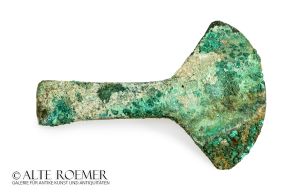 Ceremonial knife of the Sican culture
Ceremonial knife of the Sican cultureThe so-called Tumi was a weapon to cut the throats of humans and animals in ritual sacrifices. The Tumi certainly fulfilled an additional representative function in the afterlife. From the period of the Sican's cultural florescence during the 10th to 12th centuries AD.
Price: on request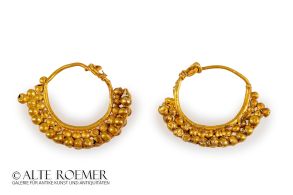 Pair of ancient gold earrings
Pair of ancient gold earringsNice example for ancient gold jewellery with elaborate decoration. From the Dr. Neumeister collection.
Price: on request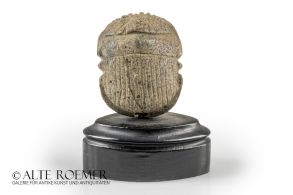 Egyptian scarab
Egyptian scarabThe scarab is made of nice greenish grey stone. Schematical upper side, structured, unengraved bottom side. From the Late Period of Ancient Egypt.
Price: on request Greek bull askos from Sicily
Greek bull askos from SicilyA find from the Greek settlement of Gela in Sicily. Great example of local pottery production in the 5th century BC. The askos offered here was extensively researched and described by Prof. Dr. Isler from the University of Zurich.
Price: on request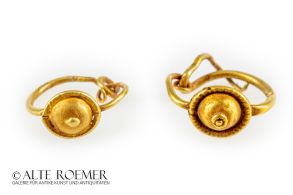 Roman gold earrings
Roman gold earringsTwo nice earrings made of gold wire, decorated by a convex round shield of gold sheet. Form the Roman Imperial period.
Price: on request

